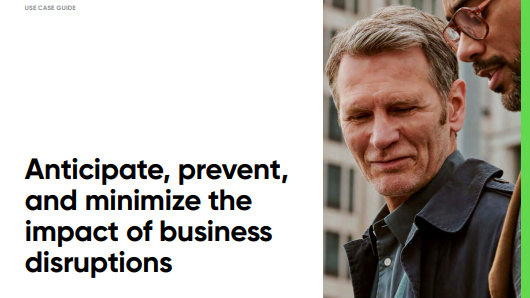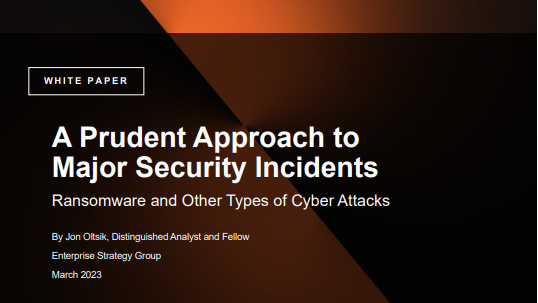Huddle: Data location is a huge customer concern
Alastair Mitchell talks data protection, collaboration and the death of email

Sign up today and you will receive a free copy of our Future Focus 2025 report - the leading guidance on AI, cybersecurity and other IT challenges as per 700+ senior executives
You are now subscribed
Your newsletter sign-up was successful
Data location is an “absolutely huge concern” to file-sharing users, according to Huddle co-founder Alastair Mitchell.
He said providing European and US datacentres is key to securing customer trust as where information is stored remains a high priority to users of cloud storage and collaboration tools.
Speaking to Cloud Pro, the CMO said: “In Europe particularly, they really care about where their data’s stored. It’s an absolutely huge concern.
“For many of their firms, they would never be able to use one of the US companies, whereas they can use Huddle, because we’ve got datacentres in the US, we’ve also got datacentres in Europe that can meet their needs.”
Fears over data location were sparked when NSA whistleblower Edward Snowden revealed US companies were handing over data stored on American soil to the spy agency under a programme known as PRISM.
His comments come after Dropbox ruled out building a European datacentre for the time being, relying instead on the Safe Harbour agreement that compels US firms to provide equivalent protection for EU citizens’ data when stored overseas.
The EU is set to introduce General Data Protection Regulations by the end of the year that will subject all foreign firms handling EU citizens’ personal data to higher standards of protecting users' information.
Sign up today and you will receive a free copy of our Future Focus 2025 report - the leading guidance on AI, cybersecurity and other IT challenges as per 700+ senior executives
This could lead to a renegotiation of the Safe Harbour agreement, as well as other similar agreements with other non-EU countries, to make them equivalently strong.
But Mitchell told Cloud Pro that there is a difference between what concerns customers and what protection is actually provided by legislation.
“What people’s perceptions are and what the law is are two different things,” he said. “People still care a lot about where their data is hosted and people still care a lot about knowing where their data locations are.
“You have to provide flexibility, not just wait for the law to catch up. But I think it will change. Over time, people will become less concerned, but that’s still three to five years away.”
He said that while some customers have spoken to Huddle about the EU data regulations, “it’s still a little bit off people’s radar”.
Mitchell was speaking to Cloud Pro at Cloud World Forum, and the rest of the discussion can be read in the Q&A below.
How would you describe the difference between Huddle and Box, or Dropbox?
As you go up from the consumer, SMB end into the large business end, the scale of collaboration changes from being a file storage and share issue to something very different.
At the lower end, I can share a file with you and 10 other people. I send you a link, and that’s collaboration as much as I care about it. But if you go up to 250 people or 1,000 people, I can’t just send a file link and expect them all to look at it or remember where it was from two months ago. You want something that looks more like a collaboration platform, a team workspace, the combination of an intranet and a file-sharing tool.
Having a workspace model is what Huddle does. I invite my team to come into [that workspace] and I host all my files, my discussions, my projects there. It’s much more than storage. It’s about a team environment for collaboration.
How important is it to integrate with a customer’s existing applications?
You have to play nicely with the rest of the stack. Two to five years ago, even a small business would buy a stack, like a Microsoft stack. They would use everything in it from Office to email, SharePoint, everything else.
Nowadays, IT managers and CIOs, are quite happy to buy best-of-breed tools because they recognise that, say, Salesforce is the best CRM tool. But what they do is make sure it plays nicely with the rest of the stack.
At Huddle we spend all our time thinking about that. We integrate with Office, so if you’re in Word you can save directly to Huddle. Increasingly our customers say ‘We’ve got SharePoint. We use it internally and we’re not going to replace it anytime soon but we know it doesn’t work externally, so we’re going to bolt on Huddle and have Huddle and SharePoint work together in one environment’.
File-sharing tools started as a shadow IT bugbear that cropped up in patches, but were never widely used because they lacked IT’s support – is that changing?
A year ago our biggest customer was 2,000 seats, our biggest customer this year will be 40,000 seats. That’s with a US government department called US Aid. These are big deployments now. Baker Tilly has already got several thousand seats, and Grant Thornton have got an enterprise-wide deployment. This has gone from being a single business team [using it] to IT-sanctioned, company-wide deployments.
Will the rise of Box, Dropbox, Huddle and others eventually kill email off?
Email is the oldest way of collaborating in the business world. It’s the digital equivalent of sending a letter, though. It’s chain-mail, with you sending my email onto someone else, and then they send it to another person.
It’s much better having a shared place where everyone can look at the same document. That is what the cloud allows you to do. I wouldn’t say file-sharing is going to kill off email, although we have a few customers looking to do that, but it’s dramatically cutting down the need to use email.
Email’s going back to what it is useful for, which is transmitting messages. But increasingly we’re using other tools like Slack, which transmit in real-time. All these tools are contributing to the killing off of email. It won’t ever fully go, but it’s tailing off.
-
 Salesforce targets telco gains with new agentic AI tools
Salesforce targets telco gains with new agentic AI toolsNews Telecoms operators can draw on an array of pre-built agents to automate and streamline tasks
-
 Four national compute resources launched for cutting-edge science and research
Four national compute resources launched for cutting-edge science and researchNews The new national compute centers will receive a total of £76 million in funding
-
 A strategic approach to security: Intelligent, collaborative, and efficient
A strategic approach to security: Intelligent, collaborative, and efficientwhitepaper How your security fabric can address the challenges of new tech investment
-
 Anticipate, prevent, and minimize the impact of business disruptions
Anticipate, prevent, and minimize the impact of business disruptionsWhitepaper Nine best practices for building operational resilience
-
 Thwart cyberthreats fast with security operations + AI Ops
Thwart cyberthreats fast with security operations + AI OpsWhitepaper How automated collaboration saves the day
-
 Three steps to transforming security operations
Three steps to transforming security operationsWhitepaper How to be more agile, effective, collaborative, and scalable
-
 Top ten ways to anticipate, eliminate, and defeat cyber threats like a boss
Top ten ways to anticipate, eliminate, and defeat cyber threats like a bossWhitepaper Improve your cyber resilience and vulnerability management while speeding up response times
-
 Automation antidotes for the top poisons in cyber security management
Automation antidotes for the top poisons in cyber security managementWhitepaper How orchestration and collaboration tools can provide a healthy defense against the most serious threats
-
 A prudent approach to major security incidents
A prudent approach to major security incidentsWhitepaper Establish an effective strategy across four phases
-
 Cybercriminals are resilient. How about you?
Cybercriminals are resilient. How about you?Whitepaper Stay ahead of those agile bad actors